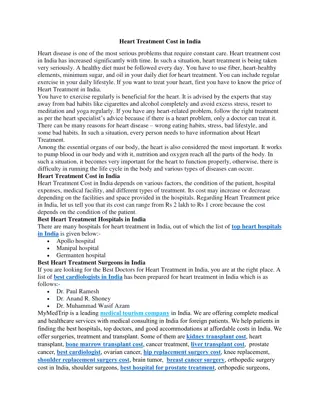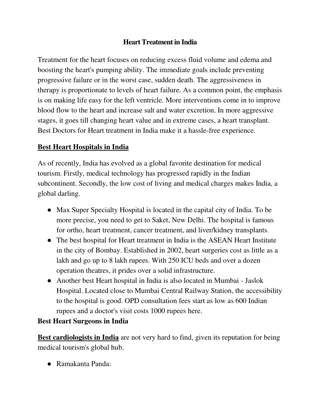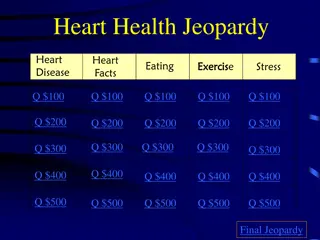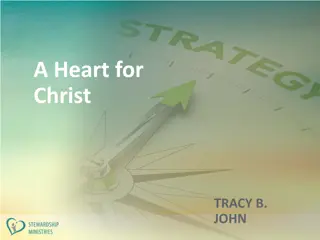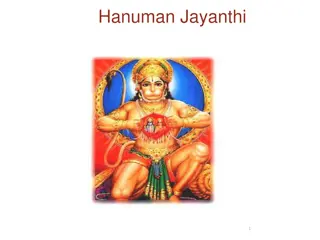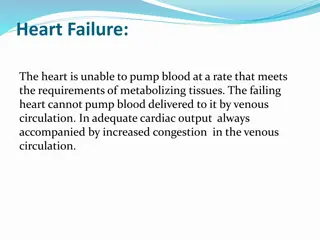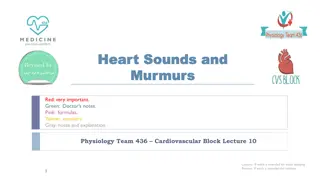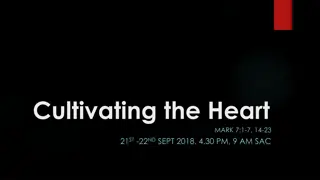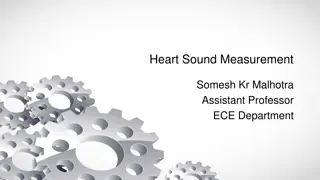
The Lord in the Heart and Prayers - Srimad Bhagavatham Insights
Explore the profound teachings from Srimad Bhagavatham about the Lord residing in the heart, the significance of prayers before recitation, and the essence of offering obeisances. Dive into the wisdom shared in these sacred texts for spiritual enlightenment and inner peace.
Download Presentation

Please find below an Image/Link to download the presentation.
The content on the website is provided AS IS for your information and personal use only. It may not be sold, licensed, or shared on other websites without obtaining consent from the author. If you encounter any issues during the download, it is possible that the publisher has removed the file from their server.
You are allowed to download the files provided on this website for personal or commercial use, subject to the condition that they are used lawfully. All files are the property of their respective owners.
The content on the website is provided AS IS for your information and personal use only. It may not be sold, licensed, or shared on other websites without obtaining consent from the author.
E N D
Presentation Transcript
The Lord in the Heart Srimad Bhagavatham 2.02.15-21
Prayers before reciting Srimad Bhagavatam Om namah bhagavate vasudevaya Shrinvatam sva-kathah krsnah punya-shravana-kirtanah hridy antah stho hy abhadrani vidhunoti suhrit satam I offer my obeisances to the Supreme Personality of Godhead, Vasudeva. narayanam namaskritya naram chaiva narottamam devim sarasvatim vyasam tato jayam udirayet Sri Krishna, the Personality of Godhead, who is the Paramatma in everyone's heart and the benefactor of the truthful devotee, cleanses desire for material enjoyment from the heart of the devotee who has developed the urge to hear His messages, which are in themselves virtuous when properly heard and chanted. SB 1.2.17 Before reciting this Srimad-Bhagavatam, which is the very means of conquest, one should offer respectful obeisances unto the Personality of Godhead, Narayana, unto Nara-narayana Rishi, the supermost human being, unto Mother Sarasvati, the goddess of learning, and unto Srila Vyasadeva, the author. SB 1.2.4 nashta-prayeshu abhadreshu nityam bhagavata-sevaya bhagavaty uttama-shloke bhaktir bhavati naishthiki By regular attendance in classes on the Bhagavatam and by rendering service to the pure devotee, all that is troublesome to the heart is almost completely destroyed, and loving service unto the Personality of Godhead, who is praised with transcendental songs, is established as an irrevocable fact.
Sri Guru Pranam Om ajnana-timirandhasya jnananjana-shalakaya chakshur unmilitam yena tasmai shri-guruve namaha Mukham karoti vacalam pangam langhayate girim yat-krpa tam aham vande sri gurum dina tarine I was born in the darkest of ignorance, and my spiritual master opened my eyes with the torch of knowledge. I offer my respectful obeisances unto him. I offer my respectful obeisances to my Spiritual Master, the deliverer of fallen souls, whose mercy turns the dumb into eloquent speakers and enables the lame to cross mountains.
nama om vishnu-padaya krishna-preshthaya bhu-tale srimate bhaktivedanta swamin iti namine namaste saraswati deve gaura-vani-pracharine nirvishesha-shunyavadi pashchatya-desha-tarine
2.2.15 sthira sukha c sanam sthitoyatir yad jih surimam a galokam k lecade ecamanonasajjayet pr nniyacchenmanas jit su O King, whenever the yog desires to leave this planet of human beings, he should not be perplexed about the proper time or place, but should comfortably sit without being disturbed and, regulating the life air, should control the senses by the mind..
Key points from the purport BG 8.14: For one who always remembers Me without deviation, I am easy to obtain, O son of P th , because of his constant engagement in devotional service. (Ananya cetah satatam..) Such devotees do not need to seek opportune moments for quitting the present body Mixed devotees - alloyed with fruitive action or empirical philosophical speculation Need an opportune moment as stated in BG 8.23-26 ( during the influence of fiery god, in the light, at an auspicious moment of the day, during the 6 months when sun travels in the north) Opportune moment is not important but being a successful yogi is important Successful yogi Must be able to control his senses by the mind Mind is easily conquerable simply by engaging it at the Lotus feet of the Lord By such service, mind becomes automatically engaged in the service of the Lord This is the way of merging into the Supreme absolute
2.2.16 mana sva-buddhy malay niyamya k etra-j a et ninayet tam tmani tm nam tmany avarudhya dh ro labdhopa ntir virameta k ty t Thereafter, the yog should merge his mind, by his unalloyed intelligence, into the living entity, and then merge the living entity into the Superself. And by doing this, the fully satisfied living entity becomes situated in the supreme stage of satisfaction, so that he ceases from all other activities..
Key points from the purport Labdopasanti stage of full bliss: cessation from material hankerings Functions of the mind: thinking, feeling and willing When mind is absorbed in material contact: it acts for material advancement destructively ending in discovering nuclear weapons When mind acts under Spiritual urge - works for going back home (BTG). Thus mind has to be manipulated by good and unalloyed intelligence Perfect intelligence is to render service unto the Lord (revealed by inquiring from the right sources Lord and His service are identical, being on the absolute plane In such service, Living entity does not remain a seer but becomes seen by the Lord transcendentally. Lord dictates the living entity to act according to His desire When the living entity follows him perfectly he ceases to discharge any other duty for his illusory satisfaction. In his pure unalloyed state he attains the stage of full bliss, labdopasanti.
2.2.17 na yatra k lo 'nimi para prabhu kuto nu dev jagat ya ire na yatra sattva na rajas tama ca na vai vik ro na mah npradh nam In that transcendental state of labdhopa nti, there is no supremacy of devastating time, which controls even the celestial demigods who are empowered to rule over mundane creatures. (And what to speak of the demigods themselves?) Nor is there the mode of material goodness, nor passion, nor ignorance, nor even the false ego, nor the material Causal Ocean, nor the material nature.
Key points from the purport Devastating time does not act on the transcendental plane Time has influence on any part of the material cosmos through birth, death, old age and disease Even Brahma is affected by this. So are the demigods. Devotees of the Lord in the transcendental state are guna tita, above the material modes of goodness, passion and ignorance Living entity is in pure consciousness and as such he has no false ego This pure consciousness directs him to the service of the Lord In that state there is neither material creation nor causal ocean for the material nature Transcendentalists: Impersonalists and devotees Impersonalists: Brahmajyoti (Full of knowledge and Eternity), are Spiritual spark Devotees: Vaikuntha planets (Full of knowledge, Eternity and bliss same as that of Lord), attain spiritual body Only through Bhakti yoga one can reach Vaikuntha planets Karma and Jnana yoga can only take one upto Brahmajyoti
2.2.18 para pada vai avam mananti tad yan neti net ty atad utsis k ava vis jyadaur tmyam ananya-sauh d h dopaguhy rha-pada pade pade The transcendentalists desire to avoid everything godless, for they know that supreme situation in which everything is related with the Supreme Lord Vi u. Therefore a pure devotee who is in absolute harmony with the Lord does not create perplexities, but worships the lotus feet of the Lord at every moment, taking them into his heart.
Key points from the purport Pure devotees do not waste time in discriminating between brahman and non-brahman They know Lord Parabrahman, by his Brahman energy, is interwoven in everything They look upon everything as the property of the Lord They try to engage in His service and does not create perplexities Who creates perplexities? Duratmas: Say Lord s form is material Speculative Believe in becoming one with the impersonal brahman Mislead others
2.2.19 ittha munis t paramed vyavasthito vij na-d g-v rya-surandhit aya sva-p r in p yaguda tato 'nila sth ne u a s nnamayej jita-klama By the strength of scientific knowledge, one should be well situated in absolute realization and thus be able to extinguish all material desires. One should then give up the material body by blocking the air hole [through which stool is evacuated] with the heel of one's foot and by lifting the life air from one place to another in the six primary places.
Key points from the purport Self realized souls completely aloof from material desires. Duratmas due to false ego try to lord it over material nature through useless and childish activities (discovery of atomic energy and space travel). Even challenge the Supreme Lord by such tiny achievements. Expert Yogi - Has control of the life air through practice and progressively moves the life air on and on to six places Six places: Navel, abdomen, heart, chest, palate, eyebrows and cerebral pit
2.2.20 n bhy sthita h dy adhiropya tasm d ud na-gatyorasi ta nayen muni tato 'nusandh yadhiy manasv sva-t lu-m la anakair nayeta The meditative devotee should slowly push up the life air from the navel to the heart, from there to the chest and from there to the root of the palate. He should search out the proper places with intelligence.
Key points from the purport There are six circles of the movement of the life air, and the intelligent bhakti-yog should search out these places with intelligence and in a meditative mood. Among these, mentioned above is the sv dhi h na-cakra, or the powerhouse of the life air, and above this, just below the abdomen and navel, is the ma i-p raka-cakra. When upper space is further searched out in the heart, one reaches the an hata- cakra, and further up, when the life air is placed at the root of the palate, one reaches the vi uddhi- cakra.
2.2.21 tasm d bhruvor antaram unnayeta niruddha-sapt yatano 'napek a sthitv muh rt rdhamaku ha-d ir nirbhidya m rdhanvis jetpara gata Thereafter the bhakti-yog should push the life air up between the eyebrows, and then, blocking the seven outlets of the life air, he should maintain his aim for going back home, back to Godhead. If he is completely free from all desires for material enjoyment, he should then reach the cerebral hole and give up his material connections, having gone to the Supreme.
Key points from the purport One should be completely free from material attachment Possible only when one is acquainted with the Supreme association of life (Param drstva nivartate) Only when one has complete understanding of the nature of spiritual life Certain class of impersonalists say spiritual life has no variety. Dangerous propaganda. Leads less intelligent men towards material enjoyment One has to fix his mind on Spiritual planets (Param dhama) and personal association of the Lord (Param) can give up material connections even while living in the material world Yogi Releases the life air through Cerebral hold by blocking the seven openings: two eyes, two nostrils, two ears and one mouth Sure sign of great devotee leaving the material connection
Key takeaways Devotional service to the lord Chanting the holy name of the lord Inquiring from knowledgeable sources about transcendental knowledge Devotional service automatically gives the benefits of controlling life air: Concentration of mind and senses Free from material connection Concentration of mind on Supreme Lord



